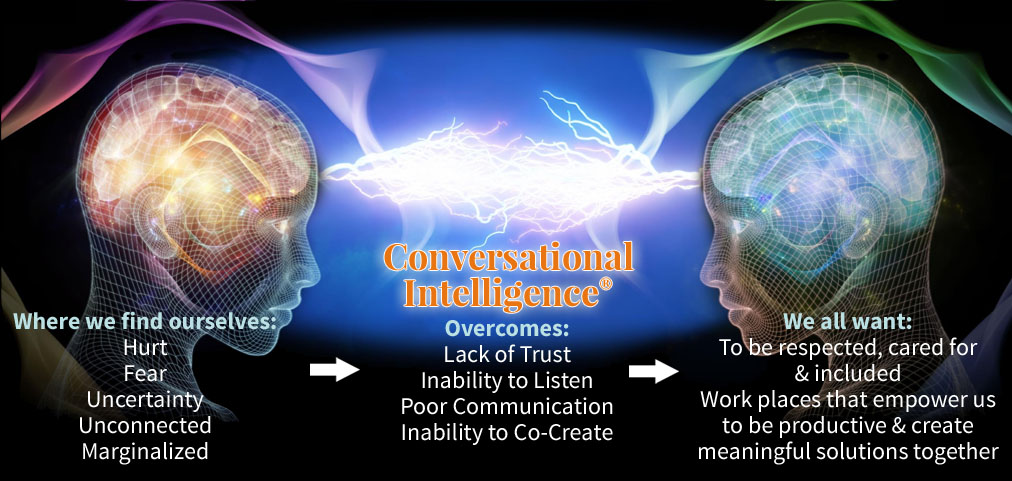Using Neuroscience-Based Tools
Suppose that you have argued with a colleague or friend, and you now avoid talking to this person. Your relationship is damaged, and you wonder how to repair and restore it — how to start over, make up, rebuild trust, and work through issues rather than move away from them.
Most of us experience moments of conflict daily as we fall prey to power, politics, and personalities. If the conflict involves something important to us, we tend to take a position and fight for our beliefs. While conflict can damage relationships, that damage can be repaired through simple approaches and rituals. Creating new conversational patterns can help you re-frame, refocus, and redirect conversations to transform anger into alignment.
For the last year, I have been studying “Conversational Intelligence” with Judith Glaser. She is the CEO of Benchmark Communications, Inc., Chairman of the CreatingWe Institute, and author of the bestselling book, “Conversational Intelligence; How Great Leaders Build Trust and Get Extraordinary Results.” Her 35-year long studies and research revealed the “starting place” of how connected people are in conversations which led to the development of the methodology called “Conversational Intelligence®.”
What she discovered by exploring the conversations in over 500 companies, that 9 out of 10 conversations fail to hit the mark. That means that when we deconstruct conversations, through research, observations, and recordings, nine conversations out of 10 are visible and anecdotal ‘low levels of connectivity.’ ‘Fail to hit the mark’ means that people walk away with different views of reality and what they agree upon.
Every conversation has a physiological impact. As we converse, neurochemicals are released in our brains, making us feel either good or bad, strong or weak, positive or negative, energetic or enervated.
Feel-good conversations spark high-level brain activity, making us open to trust, empathy and the ability to process complex situations. These talks keep the blood flowing, the energy pumping, and light up our ability to see the world in new ways.
Feel-bad conversations, on the other hand, trigger lower-level brain activity and our primitive instincts for fight, flight, and appeasement. They leave us defensive and close us off to new perspectives and opinions.
Creating new conversational rituals can repair relationships because when you look inside someone else’s meanings of words, you see how conflicts often come from the way we frame or define the words we use.
Conversational Intelligence uses a transformational approach that combines neuroscience, and coaching. The C-IQ methodology and comprehensive tools align team and individual aspirations to the most advanced part of their brain. This science-based methodology produces a very fast track to extraordinary results.
I invite you to join me in a workshop to build a stronger department/organization. Let’s use a different part of our brain to build trust and co-create solutions.
This workshop is about creating connections with each other using our executive brains and rising above how our defensive reptilian brains would have us act. We’ll be using concepts and tools from Conversational Intelligence®.
Whether it’s patient interactions, social relationships, the culture in your workplace or family relationships, the key to better connection is listening.
The four key elements you’ll learn in this workshop are:
- The different parts of the brain and how each guides our behavior
- How to build trust and watch it move across a trust continuum
- How to use the three levels of conversation
- How to ‘listen to connect’ while keeping your own values
For more information, contact me via email or call (770) 428-2334.
To get to the next level of greatness depends on the quality of culture, which depends on the quality of relationships, which depends on the quality of conversations.
Everything happens through conversations.”
– Judith Glaser

